10 facts about the Pantheon in Rome
The Pantheon is located at Piazza della Rotonda in Rome's historic centre. Mon-Sat 09.00-19.30, Sun 09.00-18.00. Last admissions are 15 minutes before closing time. During midweek public holidays, opening hours are 09.00-13.00. Guided visits are not allowed during Masses, which take place on feast days at 10.30 and Sat at 17.00.1. The Pantheon was built by Emperor Hadrian
The Pantheon in the historic centre of Rome was built by Emperor Hadrian between 119-128 AD. Before that, two buildings had existed on the same site but both burned to the ground leaving little trace, one in 80 AD and the second in 110 AD. Historians estimate that the original building was constructed somewhere between 29-19 BC by Marcus Agrippa, a Roman architect and consul, close friend, son-in-law and right-hand man to Emperor Augustus.2. The inscription
The inscription at the entrance of the Pantheon reads, in Latin: “M.AGRIPPA.L.F.COS.TERTIUM.FECIT”. It translates roughly as “Marcus Agrippa, son of Lucius, having been consul three times, made it (or Marcus Agrippa constructed this while being consul for the third time)”. Although Emperor Hadrian rebuilt the Pantheon long after Agrippa’s death, the inscription remains.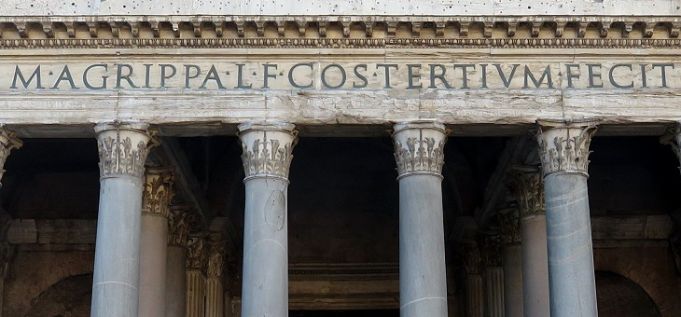
3. The columns
Sixteen columns support the arcade above which stands the inscription in honour of Agrippa. The immense columns, which were transported from Egypt, are estimated to weigh 60 tons each.4. What is the Pantheon?
What is the Pantheon? Originally, it is believed to have been a pagan temple dedicated to all Roman gods. The name pantheon has Greek roots and means all (pan) gods (theos). However, some scholars disagree with this hypothesis, claiming that its name is not necessarily proof of its activity but of its size due to the sense of awe that the Pantheon still inspires on those who admire it from up close.5. The Pantheon is a church
In the year 608 AD, Emperor Phocas gave the Pantheon to Pope Boniface IV, who consecrated it as a church in honour of St Mary and the Martyrs. It is still officially a church but no longer a parish church. It can still be visited free of charge but the Italian culture ministry has been in negotiations with the city's diocesan authorities in an attempt to introduce an entry fee beginning in early 2018.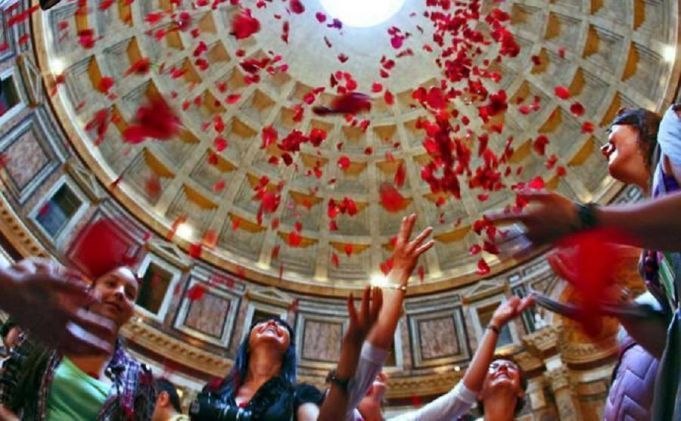
6. The Rose Petals
The dome has a circular hole at its centre called an oculus. So yes, this also means that it rains inside, which is not a problem due to the well-hidden drainage holes in the floor. What is most interesting about the open ceiling however is that on 21 April, on the celebration of Rome's birthday, the midday sun shines through the oculus on to the Pantheon's door.Also, to mark the annual Christian feast of Pentecost, a mediaeval ceremony revived in 1995 involves tens of thousands of rose petals being dropped through the oculus, symbolising the Holy Spirit’s descent to Earth. Over the centuries many of the features of Hadrian's Pantheon were sacked by emperors and popes, beginning with the Byzantine emperor Constans II in 663 who ripped the gilt bronze tiles off the roof and took them to Syracuse in order to ship them to Constantinople.
They never arrived because they were stolen by pirates on the way. In the 17th century Urban VIII took the gilt from the portico to make 80 cannons for Castel S. Angelo. However he added two campanili, sometimes attributed to Bernini, to the outside of the building. As they never fitted with the design of the original building they were finally taken down in the mid 1880s. In 1870 the new government of the united Italy took over the maintenance of the buiding and it became a national shrine and memorial to the kings of the new kingdom.
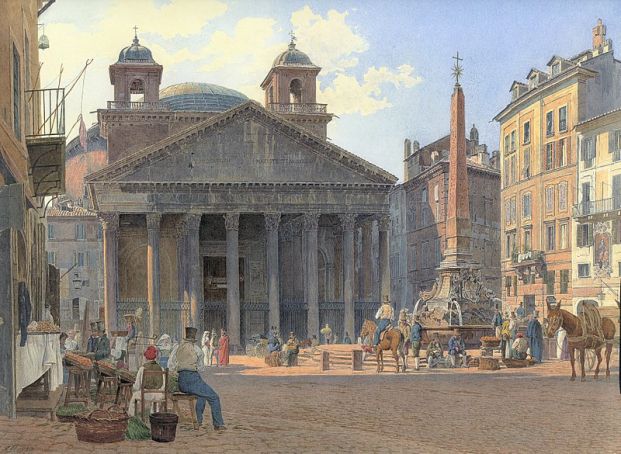
7. The Oculus
Another curiosity about the Pantheon’s dimensions is that the height from the floor to the oculus, and the diameter of the dome are the same: 43.2 m. This means that a perfect sphere could fit inside the Pantheon, which is believed to be a symbolic reference to a sacred place, or quite literally, to the celestial sphere.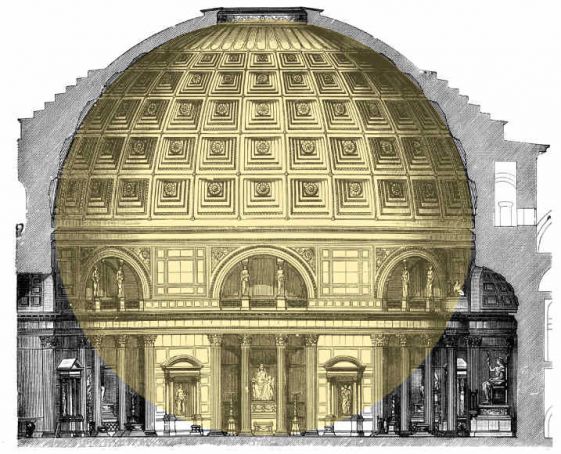
8. Raphael is buried in the Pantheon
Raphael, who died in 1520, is buried in the Pantheon next to one of his lovers, Maria Bibbiena. Gossip has it that he always intended to marry her but postponed the day repeatedly because he was having an affair with La Fornarina, immortalised in his portrait of her which now hangs in Palazzo Barberini. Numerous other painters – Annibale Caracci, Taddeo Zuccari, Baldassarre Peruzzi, Pierino del Vaga and Giovanni da Udine – are also buried there. The two first kings of Italy are enshrined inside the Pantheon, Vittorio Emanuele II and Umberto I along with his wife Margherita.9. The Dome
The Pantheon’s dome was the largest in the world for over 1300 years, until the title passed to Florence’s cathedral in 1436. Today the world record is held by the National Stadium in Singapore however the Pantheon remains in 15th place.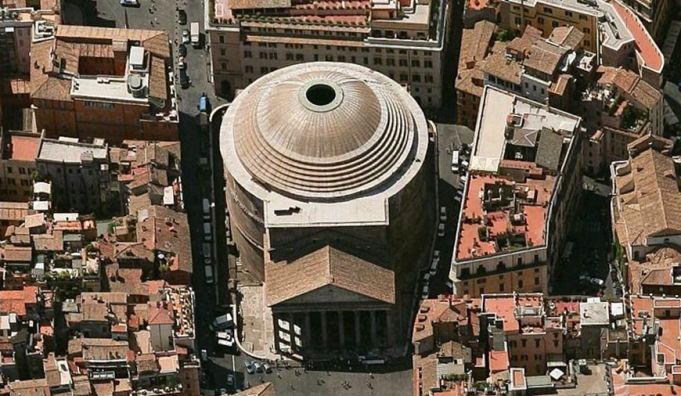
10. World Record
The Pantheon still retains a record however: it is the world’s largest concrete dome suspended without reinforcement. This is possibly due to a combination of factors, including the arches contained in the 6m-thick walls supporting the ceiling, the various densities of concrete used in the construction of the dome and its thickness which lessens gradually as it nears the centre. This is why the dome appears slightly flattened from the outside while seeming perfectly round from the inside.By Paola Berner Magalhaes
General Info
View on Map
The Pantheon in 10 facts
Piazza della Rotonda, 00186 Roma RM, Italy



















